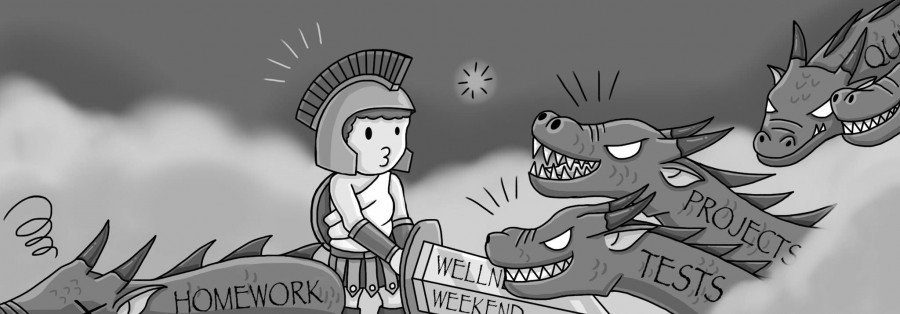Wellness Weekends Not Done So Well
October 29, 2015
Wellness Weekend at CHS doesn’t work so well.
Every so often, CHS has a Wellness Weekend, where teachers are instructed not to assign homework on Friday to be done over the weekend and turned in on Monday. It’s supposed to allow students a little time to destress, focus on extracurriculars or college applications or even go to homecoming without the burden of twenty textbook pages waiting for them when they get home.
But there’s a loophole. If assigned on Thursday, a test, project or long paper can be made due Tuesday. Since staff have discovered the caveat, wellness weekend has become synonymous with “more homework than usual over a span of four days.”
It needs to change. Wellness weekends should do what they were intended to do, rather than add another layer of stress to the workload CHS students and staff are trying to shoulder.
According to Honors Physics teacher Jennifer Czaplicki, the concept of a wellness weekend is designed to give the students an opportunity to “balance” their lives by giving them a short gap in the amount of assigned school work they have.
Though CHS had the best of intentions, it only ends up backfiring. The race-to-the-finish attitude CHS is notorious for seeps into teacher’s plans and the assignments they give.
According to Head of Social Studies Department Rodney Van Tassel, though he tries hard not pile on work for the following Tuesday, this particular Wellness Weekend came at an inconvenient time due to the end of the quarter approaching and lack of full weeks throughout September, so he had to schedule quizzes in his AP classes.
Because teachers have to teach a certain amount of material to keep up with CHS standards, the AP timeline and the reinstated assessment schedule, they have to schedule tests, projects and assignments any way they can, including over the Wellness Weekend. As long as they use the caveat: assign five days’ of work on Thursday to be due Tuesday, nothing has been assigned on Friday to be due on Monday, and teachers are following the rules.
However, the fact remains that if students treat a Wellness Weekend the way it was meant to be treated, they have to complete five days’ worth of homework in the days before and after the weekend.
According to Czaplicki, it is unreasonable to think that teachers will be able to spread material out to avoid a crunch after a Wellness Weekend. Teachers have to continue the instruction cycle of teach, practice and check mastery no matter what the schedule dictates.
It’s important to mental and physical health that every so often, there be a few days off. Yes, students still reap the benefits of the sporadic day off, snow days, and holidays. But the most essential time to recenter and focus is in the middle of the quarter.
According to data from a University of Southern California study, a break in steady flow of work refreshes the brain’s attention and motivation and encourages productivity and creativity. Additionally, the research concluded that breaks are essential for mental processes that affirm our identities, help us understand human behavior, process events and maintain a moral and ethical code.
When the back-to-school shine has worn off, the excitement of homecoming week over and the deadline of college applications looming, students just need time to breathe. So much of the week is spent in school, studying, or running back and forth between extracurriculars we hope will make us stand out. When not poring over notes or studying furiously, students need the weekend to provide them with a reprieve.
But it’s important to remember that this isn’t teachers’ fault. With CHS expectations and standards, it’s a constant rush to a nonexistent finish line, where students and staff scramble to get through material at a breakneck pace.
Though CHS students are known for being overworked and overstressed, teachers are the ones held responsible for their students’ success.
Let’s not forget—Wellness Weekend was designed for students to benefit. Teachers don’t get the same gift.
Basically, exploiting the Wellness Weekend loophole is one of the only ways they can stay on curriculum, but the fact that Wellness Weekend just ends up burning students and staff out will continue to be ignored in favor of academic rigor and reputation.
According to Czaplicki, when a student has a heavy academic, social and extracurricular load, eventually something will have to give.
Aside from CHS changing its attitude towards students and staff’s mental health and happiness, Wellness Weekend could be made more effective by only allowing formative assignments to be assigned on Friday to be due or assessed the following Monday. This way, teachers can still move forward in the curriculum, but the homework and scheduled assessments will be a lighter load than trying to cram in summative assessments due Tuesday.
Or CHS could just calm down, take a moment to assess the situation and realize that having an overstuffed schedule in the first place can’t be undone in one “Wellness Weekend.”


